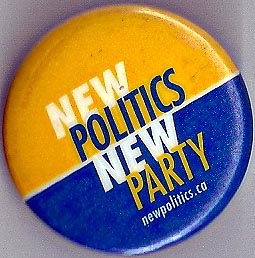When I told my brother that we were at the 10th anniversary of the New Politics Initiative, he replied, “Really only 10 years ago? It seems much longer.” When the co-founder of the NPI Jim Stanford suggested to me that we write a look back at the NPI, my first reaction was not overly positive. It seems like another era when he and I were so enthusiastic about the anti-globalization movement that we thought it was worth a try to convince the NDP to open its arms not only to that movement but to other forces on the Left and start a new united party based on different principles.
So I went back not only to the Statement of Principles of the NPI but to an article:
“Contrary to what you have seen in the media, the NPI is not primarily about moving the NDP to the left.
“The NPI is about a new kind of politics — it’s about being more participatory, more engaging, more open and more diverse.
“NPI argued that the NDP must open itself to the new forces of the anti-globalization movement by initiating the formation of a new party. What became clear over the course of last weekend’s NDP convention is the new initiative is really about transforming left-wing politics by bringing together the best traditions of the old left with the radical democracy of the new.”
What do you know? The NPI was actually just 10 years ahead of its time. In some ways, it was the last try in Canada to bring together social movements and a political party. We were still hopeful that a political party could be the instrument of change. Some people in the NPI thought Jack Layton would take the party in that direction. I was disappointed that in many ways, he took it in the opposite direction, professionalizing and moving away from its grassroots.
The new participatory democracy activists of the Occupy movement are a lot more radical than the NPI, but they have the same idea: that participatory democracy will be the route to fundamental social and political change. Party politics have become so discredited that no-one I’ve heard in the Occupy movement associates with any political party.
In a panel discussion sponsored by The Nation, Occupy Wall Street organizer Patrick Bruner: “We elected Obama but he also got more money from Wall Street than any single candidate. Until we have a government that listens to people instead of the listening to money, we are not interested in the government.” He made clear he was speaking for himself but I think it is a feature of the Occupy movement that many of them don’t see anyone in government who represents them.
Bruner’s comments reflect the thinking of young people in Europe as well. The recent election of conservative governments across Europe reflect much more the mass disillusion of people with the establishment socialist parties than any rise of right-wing support.
But then no-one in the anti-globalization movement talked much about political parties. It was older activists like Jim, Libby Davies, Svend Robinson and I who first called for a new kind of party. There were representatives of the anti-globalization generation like Naomi Klein and Dave Meslin at our first meeting and they contributed to the original declaration. In fact, Jim and I thought it should be a manifesto. They disagreed and thought it should be an open declaration of principles that we would put on line and let people discuss and change. As the NPI grew, more and more young people got involved.
Most of us in the youth movements of the ’60s didn’t think much of political parties either. Nevertheless the Waffle emerged in the NDP putting forward very progressive policies like support for women’s liberation and Quebec’s right to self-determination, which were eventually adopted by the party. The NDP leadership treated the Waffle like an internal enemy rather than the injection of youthful energy that it was. To be fair the Waffle was pretty sectarian, as was the practice of the day. But still the party forced the Waffle out and in my view cut its heart out in the process, leaving it to decades in the political wilderness.
The NPI was a sign that the NDP could recover its energy in the 21st century. Jack did manage to accomplish that. Not by engaging in participatory democracy and closer relations with social movements, as the NPI suggested, but by the gains in Quebec and by embracing both the left and the right in the party, which no leader had done since the ’60s.
I am not sure if there will be a reflection of Occupy inside the NDP. Hopefully some of the leadership candidates will pick up more than just rhetoric from Occupy.
What I’ve learned since the foundation of the NPI is that no political party of the left can set the agenda and bring about any kind real change without powerful social movements pushing it to do so. So I will be focusing my energy on supporting the Occupy movement and whatever comes out of it. I’ll be happy if the NDP reflects some of the deep learning that Occupy is already providing but I’m not going to hold my breath.
Judy Rebick was a co-founder of the NPI in 2001 and founded rabble.ca that same year. She is a writer and activist who blogs for rabble.ca.



